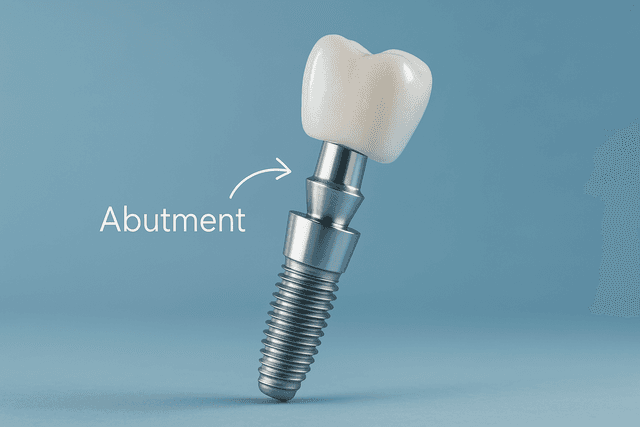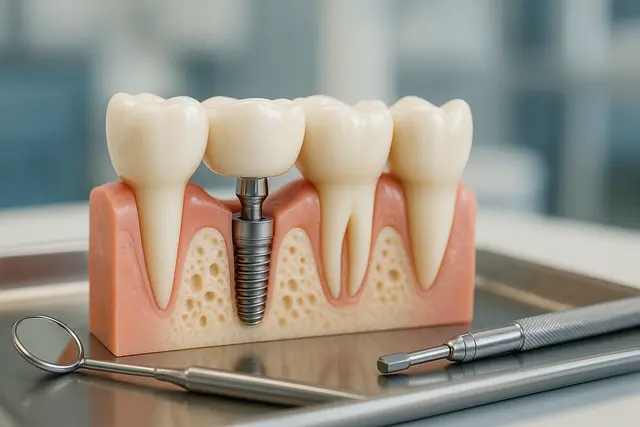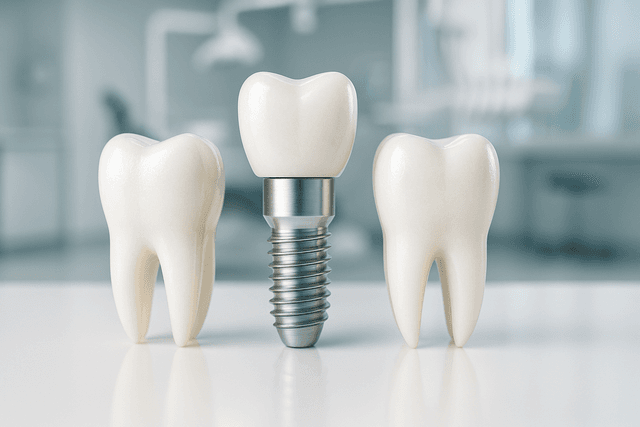Prosthodontics
5 min read
May 13, 2025
Dental Implant Removal Recovery Time: What to Expect After Surgery
If your dental implant didn’t work out and now you’re facing removal, you’re probably wondering what the recovery is going to be like. Will it hurt? How long before you can chew normally again?

So, your dental implant didn’t go quite as planned. Maybe it never felt right. Maybe it caused discomfort. Or maybe it just flat-out failed. Whatever the case, your dentist mentioned the words dental implant removal, and now you’re wondering what recovery looks like. How bad is it? How long will it take? Are you going to be eating mashed potatoes for weeks?
Let’s walk you through what really happens after a dental implant is removed, and what you can expect every step of the way.
When Dental Implant Removal Is Necessary
Dental implants are designed to last. They’re like the overachievers of the tooth replacement world. But they’re not invincible. Sometimes, removal is necessary due to implant failure, infection, bone loss, or pain around the implant that just won’t quit.
Your dentist may need to remove the implant without disturbing too much of the surrounding bone tissue. The goal is always to preserve as much healthy bone as possible to support a new implant later, if that’s in the cards.
Common causes for failed dental implants include:
Infection in the gum or bone around the implant
Poor osseointegration (when the implant doesn’t properly fuse with the jawbone)
Trauma to the implant site
Implant dentistry techniques that weren’t quite right for your case
The Removal Procedure: What Happens During Surgery
Let’s clear up one big worry first: you won’t feel any pain during the removal procedure. Your dentist or oral surgeon will use local anesthesia to numb the area. If you're nervous, they might offer sedation.
Now, if the implant hasn’t integrated well into the jawbone, the dentist can usually loosen the implant with minimal fuss. But in some cases, especially if it's tightly fused into the bone, they might need to do a bit more work. This could include removing a small amount of bone surrounding the implant.
If infection or damage has occurred, the dentist may perform a bone graft right after removing the implant. This helps preserve the jawbone and prepare the area for a possible new implant in the future.
Recovery Time: How Long It Takes to Heal
The recovery process isn’t one-size-fits-all. It depends on various factors like how long the implant was in place, the condition of the bone and gum tissue, and whether a bone graft was involved.
Generally, the recovery period lasts about a week to two weeks, but full healing of the jawbone can take several months, especially if you’re planning to support a new implant later. For some patients, it takes three to six months for the bone to regenerate enough for dental implant placement.
Two days after surgery, you might experience some pain and discomfort, especially when brushing near the area or eating. Don’t panic, this is totally normal.
Weeks after surgery, most patients are back to their normal routines. Just keep in mind that the bone is still healing beneath the surface, even if you feel fine on the outside.
Post-Implant Removal Care Tips
Aftercare is key if you want to recover fully and avoid complications. Here’s what your dental team will likely recommend:
Stick to soft food (hello again, mashed potatoes) for at least a few days after surgery.
Use over-the-counter pain medication as directed to manage soreness.
Keep your oral hygiene on point, but be gentle when brushing near the implant site.
Avoid smoking, alcohol, or anything that increases the risk of infection.
Rest. Seriously. Don’t go running a 5K two days after surgery. Give your body time to heal.
If you notice excessive bleeding, swelling that won’t quit, or signs of infection, call your dentist right away. Recovery should trend in the better direction, not worse.
What If the Implant Was a Failure?
A failed implant doesn’t mean your smile dreams are over. Sometimes, implants are removed and replaced with narrow implants or different styles that better fit your jaw structure.
In other cases, your dentist may recommend a denture or other tooth replacement option, depending on the health of your jawbone and gum tissue.
Whether the issue was bone loss, poor implant placement, or simply your body rejecting the implant, your oral surgeon or dentist will help figure out the next steps. Don’t beat yourself up, implant failure isn’t always predictable.
Considering a New Dental Implant?
You might be a candidate for a new dental implant, just not right away. If a bone graft was placed during your removal surgery, your dentist will give it time to heal before jumping into a new implant placement procedure.
For some, the jawbone may take months to rebuild enough to support a new implant. For others, the damage may mean exploring non-implant options like a bridge or denture.
This is where a good consultation with your dental team really matters. They'll evaluate your oral health, review your healing, and discuss a plan that makes sense for your mouth, not someone else’s.
The Cost of Removal
Let’s be real: removing dental implants isn’t free. The removal cost depends on how complex the surgery is, whether anesthesia or sedation is used, and if additional procedures like bone grafting are involved.
Insurance may or may not help, especially if the implant failure is tied to a preexisting condition. Be sure to ask upfront so there are no surprises.
Getting Dental Implants in the Future
If you’re still committed to getting dental implants, don’t let one hiccup scare you off. The majority of implants are successful, and modern implant dentistry is more precise than ever.
If your body responded poorly this time, your dental surgeon might adjust the implant placement strategy or switch up the materials used. Sometimes it’s just a matter of finding the right combo of timing, tools, and technique.
Final Thoughts
It’s frustrating to deal with a failed implant or go through a removal surgery after all the hope you put into your original procedure. But your gums, jaw bone, and long-term oral health will thank you for handling it properly.
The recovery time may feel slow, and removal isn’t exactly fun, but with the right aftercare and support, most patients recover without issues and go on to have successful tooth replacement down the road.
Can Dental Implants Be Removed Without Damaging the Jaw?
Yes, dental implants can be removed with minimal impact to the surrounding bone, especially if they haven't fused well. Your dentist aims to preserve healthy bone for future implant options and may even perform a bone graft during the same procedure if needed.
How Painful Is Dental Implant Removal and Recovery?
The procedure itself is painless thanks to local anesthesia, and sedation may also be offered. Some soreness is normal for a few days afterward, but most patients manage it easily with over-the-counter pain relief. Recovery typically takes 1–2 weeks for soft tissue and several months for full bone healing.
Can I Get Another Implant After One Fails?
Often, yes, but not right away. If bone grafting was needed, your jaw will need time to heal before a new implant can be placed. Your dentist will reassess your bone density and oral health before planning the next steps.
What Should I Do After an Implant Is Removed?
Stick to soft foods, avoid alcohol and smoking, and brush gently around the area. Follow your dentist’s post-op instructions closely to reduce the risk of infection and ensure proper healing. Call your provider if you notice unusual swelling, pain, or bleeding.
Read Next
Related Posts

Prosthodontics
Implant Abutment Explained: What It Is and Why It Matters
Dental implants have revolutionized the way we restore missing teeth, but there's more to them than just the visible crown. One often-overlooked component, the implant abutment, plays a crucial role in both the function and appearance of the final result. Understanding what it is and why it matters can make all the difference in your implant journey.
4 min read
Oct 10, 2025

Prosthodontics
Pros and Cons of Implant Retained Bridges: A Simple, Honest Overview
Missing teeth can affect more than just your smile, they can impact your confidence, speech, and even how you eat. With so many options out there, it’s easy to feel lost in dental jargon and marketing buzzwords. That’s why we’re breaking down implant retained bridges in plain English, highlighting the pros and cons so you can make an informed choice without the fluff.
6 min read
Oct 10, 2025

Prosthodontics
Implant Crown Lifespan: What to Expect
Getting a dental implant crown is a big step toward restoring both function and confidence in your smile. But like any dental work, it's natural to wonder how long it will actually hold up. From materials and maintenance to daily habits, several factors play a role in how long your implant crown will last.
4 min read
Oct 10, 2025
Don’t have time to research every dentist around you?
See why 30k+ patients trusted us